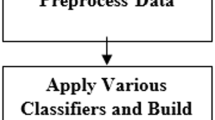Abstract
In this paper we are going to show how to discover interesting prediction rules from student usage information to improve adaptive web courses. We have used AHA! to make courses that adapt both the presentation and the navigation depending on the level of knowledge that each particular student has. We have performed several modifications in AHA! to specialize it and power it in the educational area. Our objective is to discover relations between all the picked-up usage data (reading times, difficulty levels and test results) from student executions and show the most interesting to the teacher so that he can carry out the appropriate modifications in the course to improve it.
Preview
Unable to display preview. Download preview PDF.
Similar content being viewed by others
References
Agrawal R., Srikant R. (1994) Fast Algorithms for Mining Association Rules. Conf. on Very Large Databases. Santiago de Chile.
Brusilovsky, P. (1998) Adaptative Educational Systems on the World-Wide-Web: A Review of Available Technologies. Conf. on ITS. San Antonio.
Coello, C.A. (1999) An Updated Survey of Evolutionary Multiobjetive Optimization Techniques: State of the Art and Future Trends. IEEE pp. 3–13.
De Bra P., Ruiter J. (2001). AHA! Adaptive Hypermedia for All. Conf. on WebNet. Orlando, Florida.
Freitas, A. A. (2002) A survey of evolutionary algorithms for data minig and knowledge discovery. Advances in Evolutionary Computation. Springer-Verlag.
Michalewicz, Z. (1996) Genetic Algorithms + Data Structures = Evolution Programs. 3rd edn. Springer-Verlag, Berlin Heidelberg New York
Noda E., Freitas A., Heitor S.L. (1999) Discovering Interesting Prediction Rules with a Genetic Algorithm. Conf. on Evolutionary Computation. Washington DC.
Piatesky-Shapiro G., Matheus J. (1994) The interestingness of deviations. Proceedings of the AAAI-94 Workshop on KDD. Seattle, Washington.
Romero, C., De Castro, C., Ventura, S. Hall W., Hong M. (2002). Using Genetic Algorithms for Data Mining in Web-based Educational Hypermedia System. Workshop on Adaptive Systems for Web-based Education. Malaga.
Tan, P., Kumar V. (2000) Interesting Measures for Association Patterns: A Perspective. TR00-036. Department of Computer Science. University of Minnesota.
Zaïne, O. R. (2001) Web Usage Mining for a Better Web-Based Learning Environment. Conf. on Advanced Technology for Education, Banff, Alberta.
Zytkow J., Klosgen W. (2001) Handbook of Data Mining and Knowledg Discovery. Oxford University Press.
Author information
Authors and Affiliations
Editor information
Editors and Affiliations
Rights and permissions
Copyright information
© 2003 Springer-Verlag Berlin Heidelberg
About this paper
Cite this paper
Romero, C., Ventura, S., de Bra, P., de Castro, C. (2003). Discovering Prediction Rules in AHA! Courses. In: Brusilovsky, P., Corbett, A., de Rosis, F. (eds) User Modeling 2003. UM 2003. Lecture Notes in Computer Science(), vol 2702. Springer, Berlin, Heidelberg. https://doi.org/10.1007/3-540-44963-9_6
Download citation
DOI: https://doi.org/10.1007/3-540-44963-9_6
Published:
Publisher Name: Springer, Berlin, Heidelberg
Print ISBN: 978-3-540-40381-4
Online ISBN: 978-3-540-44963-8
eBook Packages: Springer Book Archive




